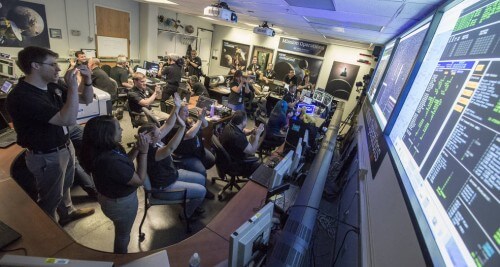Among the congratulators was also the astrophysicist Stephen Hawking. President Obama tweeted

The call everyone was waiting for has arrived. The New Horizons spacecraft "phoned home" shortly after 04:00 pm EST yesterday (Tuesday) - (XNUMX:XNUMX today Israel time) and told the crew members and the world that it had completed the historic achievement of the first transit near Pluto.
The pre-programmed "conversation" is actually a 15-minute series of status messages transmitted to the control center at the Applied Physics Laboratory at Johns Hopkins University in Maryland, via NASA's Deep Space Network. These signals sealed a 21-hour blackout, designed to allow it to extract maximum data and not transmit it to Earth until after the transit near Pluto.
Due to the enormous distance - 5 billion kilometers, it takes four and a half hours for the signals to reach the Earth even though they travel at the speed of light. Due to the slow 'surfing speed' of the spacecraft (2 kilobits per second) it will take 16 months to download the scientific data currently being collected by the spacecraft and the treasure that will be collected in this mission will be explored for many more decades.
When the reports arrived about the success of the transit, US President Barack Obama tweeted: "Pluto has gained its first visitor. Thanks to NASA. This is a great day for discoveries in space and for the leadership of the USA".
"I know that today we have inspired an entire generation of curious people thanks to this great success, and we look forward to the discoveries that are yet to come," said NASA Administrator Charles Bolden. "This is a historic achievement for scientists and discoveries. We have once again raised the bar of human potential."
"With this successful flyby, we are celebrating the pinnacle event in the golden age of solar system exploration," said John Grunsfield, NASA's assistant administrator for science missions at the agency's headquarters in Washington. While this historic event has yet to be revealed - as the images from Pluto have yet to arrive - the new age of discovery in the solar system is just beginning. NASA spacecraft will uncover the mysteries of Mars, Jupiter, Europa (Jupiter's moon) and other worlds orbiting the Sun in the coming years.
Pluto is the first object in the Kuiper Belt to be visited by a spacecraft from Earth. New Horizons will continue its journey deep into the Kuiper Belt, where the surrounding objects preserve frozen clues to the formation process of the Solar System.
"New Horizons follows in the footsteps of successful research missions that have reached the edge of the solar system: Mariner, Pioneer and Voyager," says New Horizons principal investigator Alan Stern of the Southwest Research Institute in Boulder, Colorado. New Horizons completes the first era of planetary research spacecraft that lasted fifty years and will forever be remembered in the legacy of our time.",
"On behalf of all of us here at the Applied Physics Laboratory at Johns Hopkins University, I would like to congratulate the New Horizons team for the dedication, skill, creativity and demonstration of how to achieve this historic achievement." says APL director Ralph Sgt. We are proud to be part of an amazing team of scientists, engineers and mission experts from across the US who have worked tirelessly to ensure the success of this mission."
Among the congratulators (although he did so via video) is Prof. Stephen Hawking who said: "The discoveries of New Horizons may help us better understand how the solar system was formed."
"We discover the solar system because we are human and we want to know. I hope Pluto will help us on this journey. I will watch it closely and I hope you will too," he said, addressing the audience listening to the video from all over the world
More on the subject on the science website"
- Images of Pluto and Charon taken by New Horizons in artificial colors highlight the enormous variety of terrain trajectory on these two worlds
- NASA is celebrating the passage of New Horizons at the closest point to Pluto and is waiting to renew contact with it early in the morning
- Technion researchers have proposed a model for finding new moons for Pluto, awaiting New Horizons photographs
- New Horizons revealed: Pluto's diameter is 2,370 km
- New Horizons approaches Pluto - photographed the enigmatic dark spots
- Discoverer of Pluto, the girl who gave him his name and the actor Leonard Nimoy will be commemorated on Pluto and Charon
- A historic meeting
- A whale on Pluto
- Pluto - a point of light in the darkness

3 תגובות
At such a distance, considering that you want to save energy and the high amount of errors that can occur at such distances due to interference, we go for it
The question is over
Why the slow browsing speed?
There is no zero, every new story of space research is unusually exciting.